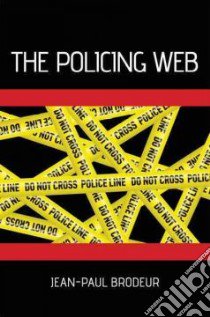The Policing Web - 9780199740598
Un libro in lingua di Jean Brodeur Paul edito da Oxford University Press, 2010
- € 74.40
- Il prezzo è variabile in funzione del cambio della valuta d’origine
"A tour de force, deeply rooted in history and philosophy. An exciting journey that challenges conventional thinking. Refreshingly personal. Utterly scholarly. A wonderful contribution to our field."-Clifford Shearing, University of Cape Town
"New vision is rare in police studies; for forty or more years scholars have echoed each other and sought a perspective that sets out the changing nature of policing. Jean-Paul Brodeur has produced such a perspective, a framework that elaborates and specifies Bittner, setting out questions for the twenty-first century. Detailed, comparative, and historical and based on empirical research, this book presents a new vision of policing."-Peter K. Manning, Brooks Chair of Policing and Criminal Justice, Northeastern University
"A superb, theoretically sophisticated analysis of the idea of policing and its development in many cultures. It is richly informed by deep and wide knowledge of the research and historical literature, as well as wider debates in philosophy and social theory. Erudite, provocative, insightful, and stimulating, it offers a magisterial overview of the field."-Robert Reiner, Professor of Criminology, London School of Economics and Political Science
Nearly all research devoted to policing focuses on public uniformed police and their legal use of force. An overwhelming am writ of this work draws on evidence from Anglo-American police forces. These twin emphases have led to a limited view. Agencies such as criminal investigation units, intelligence services, private security companies, and military policing organizations have almost entirely escaped scholarly attention.
In The Policing Web, Jean-Paul Brodeur looks at policing as a whole. He illuminates its full diversity, showing how it extends far beyond the confines of public police working in uniform and visible to all. Brodeur considers military policing, both when it complements the values of democracy and when it does not. He also discusses criminal individuals acting as police informants, and criminal organizations enforcing their own rules in urban zones deserted by the police. Brodeur arguer that the diverse strands of the policing web are united by a common definition that emphasizes the license granted to policing agenciesùlegally or with impunityùto use means otherwise forbidden to the rest of the population. Employing an international and comparative approach, Brodeur establishes a comprehensive model that links all the components of policing. The policing web, however, is not a neat and well-integrated structure. There is not just one policing web There are several, depending on the country, the police history and culture, in the various public images of policing These often overlooked factor s are essential components of the context of policing
Wide-ranging and authoritative, The Policing Web expands the very idea of what policing is and how it works, and presents a novel yet fundamental understanding of law enforcement.
Informazioni bibliografiche
- Titolo del Libro in lingua: The Policing Web
- Lingua: English
- Autori : Jean Brodeur Paul
- Editore: Oxford University Press
- Collana: Oxford Univ Pr (Hardcover)
- Data di Pubblicazione: 30 Settembre '10
- Genere: SOCIAL SCIENCE
- Argomento: Police
- Pagine: 404
- ISBN-10: 0199740593
- EAN-13: 9780199740598


